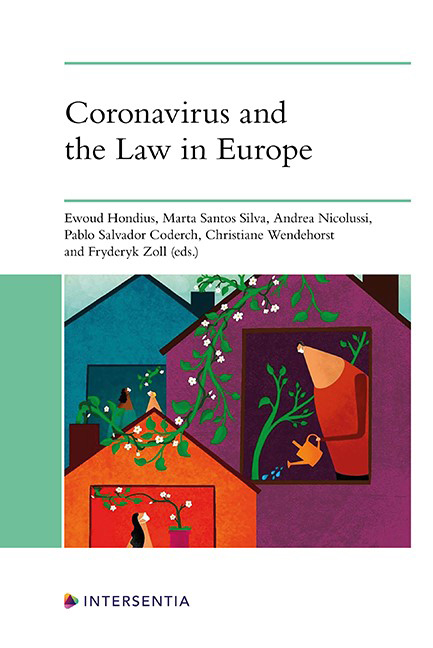Book contents
- Frontmatter
- Preface
- Contents
- List of Keywords
- List of Contributors
- PART I COVID-19 AND FUNDAMENTAL RIGHTS
- PART II STATES AGAINST THE PANDEMIC
- PART III COMPENSATION FOR COVID-19 RELATED DAMAGE
- PART IV CONTRACT LAW
- PART V CONSUMER LAW
- PART VI LABOUR AND SOCIAL LAW
- PART VII CORONAVIRUS CHANGING EUROPE
- Epilogue
- Annex: ELI Principles for the COVID-19 Crisis
- About the Editors
Consumer Law and COVID-19 in Portugal
Published online by Cambridge University Press: 10 December 2021
- Frontmatter
- Preface
- Contents
- List of Keywords
- List of Contributors
- PART I COVID-19 AND FUNDAMENTAL RIGHTS
- PART II STATES AGAINST THE PANDEMIC
- PART III COMPENSATION FOR COVID-19 RELATED DAMAGE
- PART IV CONTRACT LAW
- PART V CONSUMER LAW
- PART VI LABOUR AND SOCIAL LAW
- PART VII CORONAVIRUS CHANGING EUROPE
- Epilogue
- Annex: ELI Principles for the COVID-19 Crisis
- About the Editors
Summary
Periods of crisis have a negative impact on the level of consumer protection, with the emphasis on other objectives, in particular those linked to the functioning of the market. This contribution aims at demonstrating that, in Portugal, measures adopted to face the economic and social effects of COVID-19 can be characterised as twofold: those that reduce the level of consumer protection and those that aim to protect particularly vulnerable consumers. Evidence will be given in the following fields: tourism (package travel, hotel or short-term accommodation bookings), services of general interest (in particular, water, electricity, gas and telecommunications provision), credit agreements (both mortgage credit and consumer credit), electronic payments, sale of goods, and the price-reduction commercial practice of sales.
INTRODUCTION
Although the first signs of an imbalance in the consumer/trader relationship preexisted,the issue of consumer protection, understood as such, has its historical landmark in the famous speech of John F. Kennedy, delivered in Congress on 15 March 1962. In that speech, the American President Kennedy stressed that “consumers, by definition, include us all”, adding that, although they are not organised and are not heard, they constitute the largest economic group acting in the market, being influenced by (and influencing) all the decisions taken at this level.
Consumer law was born and developed in the following decades in unique conditions of peace, economic growth and democracy. It developed, in particular, in places and at times of greatest economic growth. In recent human history, conditions had never been more favourable for the State and its citizens, its representatives, including producers, distributors and traders, to be concerned with the adoption of greater protection of the consumer.
The economic crisis erupted in 2008, with particular vigour in those States where consumer protection had triumphed, and shook the perfect conditions for peace, economic growth and democracy necessary for the development of consumer law. The crisis fundamentally called into question the assumption of economic growth, although its effects on peace and democracy should not be overlooked.
The pandemic crisis that we are currently experiencing – and which still seems to be at its beginning – once again calls into question the ideal conditions for the development of consumer law, first because it affects economic growth, but also peace and democracy may be weakened in many geographical contexts.
- Type
- Chapter
- Information
- Coronavirus and the Law in Europe , pp. 849 - 866Publisher: IntersentiaPrint publication year: 2021



